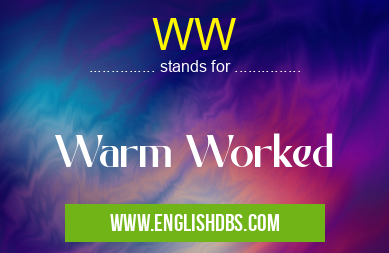What does WW mean in UNCLASSIFIED
WW (Warm Worked) refers to a metalworking process in which a metal workpiece is subjected to plastic deformation at elevated temperatures. This process is typically performed to enhance the mechanical properties of the metal, such as its strength, toughness, and ductility.

WW meaning in Unclassified in Miscellaneous
WW mostly used in an acronym Unclassified in Category Miscellaneous that means Warm Worked
Shorthand: WW,
Full Form: Warm Worked
For more information of "Warm Worked", see the section below.
WW Meaning
- Warm Working: Metalworking process performed at elevated temperatures below the recrystallization temperature of the metal.
- Purpose: Enhances mechanical properties, including strength, toughness, and ductility.
- Benefits: Improved strength-to-weight ratio, increased toughness, enhanced fatigue resistance.
WW Process
- Involves heating the metal workpiece to a temperature below its recrystallization point.
- The metal is then subjected to plastic deformation through processes such as rolling, forging, or extrusion.
- This deformation alters the microstructure of the metal, resulting in improved mechanical properties.
Applications of WW
WW is commonly used in the manufacturing of automotive components, aerospace parts, medical devices, and other industries where enhanced mechanical properties are required. It is particularly suitable for metals with high strength-to-weight ratios, such as:
- Aluminum alloys
- Magnesium alloys
- Titanium alloys
- Nickel-based superalloys
Essential Questions and Answers on Warm Worked in "MISCELLANEOUS»UNFILED"
What is Warm Worked (WW)?
Warm Worked (WW) refers to a specific type of metal forming process where metal is worked above room temperature but below its recrystallization temperature. This process involves applying pressure or force to the metal while it is at an elevated temperature, typically between 50% and 75% of its melting point. Warm working can improve the properties of the metal, such as its strength and ductility.
What are the advantages of Warm Working?
Warm Working offers several advantages over cold working and hot working processes. It provides:
- Increased strength and ductility compared to cold working
- Reduced energy consumption compared to hot working
- Improved surface finish
- Enhanced dimensional accuracy
- Reduced springback effect
- Suitable for materials that are difficult to cold work
What are the limitations of Warm Working?
Warm Working also has certain limitations:
- May be more expensive than cold working
- Can lead to grain growth if the temperature is too high
- Safety precautions are necessary due to the elevated temperatures involved
- Requires specialized equipment and tooling
What materials are suitable for Warm Working?
Warm Working is best suited for metals that are ductile and have high workability, such as:
- Aluminum
- Copper
- Brass
- Steel
- Titanium
- Nickel alloys
Final Words: WW (Warm Worked) is a metalworking process that involves plastic deformation of a metal workpiece at elevated temperatures. This process significantly enhances the mechanical properties of the metal, making it a valuable technique in various industrial applications. By carefully controlling the temperature and deformation parameters, engineers can optimize the properties of the metal to meet specific design requirements.
WW also stands for: |
|
| All stands for WW |
